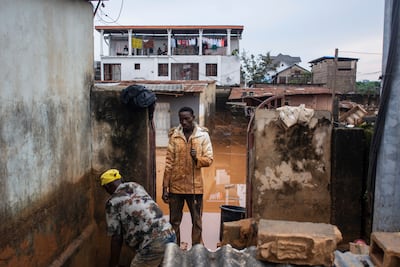A historic biodiversity agreement signed at a UN conference has been hailed as a major step forward for indigenous rights and the protection of the planet's ecosystems.
The accord passed at Cop15 in Montreal is the most significant commitment to protect the planet's biodiverse areas, most of which are managed by indigenous peoples.
It pledges to protect 30 per cent of the world's lands, seas, coasts and inland waters by 2030, up from the current 17 per cent of land and 10 per cent of marine areas.
Developing nations will also receive at least $30 billion by 2030 in a bid to help poorer countries care boost nature.
The Democratic Republic of Congo opposed the agreement, which has been worked on for the past four years, claiming the financial package, under which poorer nations would receive $20 billion by 2025, was insufficient. Representatives from Cameroon and Uganda also said they did not support the accord and it was "forced by hand."
The UN said it was passed according to official standards, saying the DRC's remarks did not amount to an official objection.
The Kunming-Montreal Global Diversity Framework has been hailed by various world leaders, including EU chief Ursula von der Leyen, who praised it as a "road map to protect and restore nature".
The framework also aims, among other goals, to halve global food waste and reduce to "near zero" the loss of wildlife-rich habitats in the next seven years.

Indigenous land rights are also protected under the agreement, which ensures people can remain stewards of their lands and safeguards communities from mass eviction.
Eighty per cent of the world's biodiverse land is managed by indigenous peoples, according to the World Bank, and indigenous communities have been at the forefront of climate disasters and calls for urgent action to protect the planet.
"We were afraid that if we did not have any inclusion in target three, we could suffer human rights violations in the name of conservation," said Viviana Figueroa, a representative of the International Indigenous Forum on Biodiversity, who is from the Omaguaca-Kolla indigenous peoples of northern Argentina.
The forum praised the text for its "strong language on respect for the rights of Indigenous Peoples and local communities".
Some experts believe the "30 by 30 pledge" is not enough, and argue for a 50 per cent benchmark.
Others are sceptical the agreement will lead to significant change as states are still responsible for taking the initiative.
Aslak Holmberg, president of Finland's Saami Council and the International Indigenous Forum on Biodiversity regional co-ordinator for the Arctic, said the pact was a "major step" for indigenous peoples but "a lot of it is still in the hands of the states".
"I'm not convinced that this agreement will be so fundamentally different that it will change the course of how the states are acting towards and against nature," he was cited by AFP as saying.
The conference, which kicked off on December 6, sparked protests in Montreal, where climate and indigenous rights activists said commitments to stop climate change were little more than lip service.
"The framework says lots of good things, but the lack of specifics and vague language in places is unhelpful," Stuart Butchart, chief of BirdLife International, said on Twitter.
"Ultimately it will all come down to implementation. If governments do all they commit to here, the world will be a far better place — for people and for nature."

